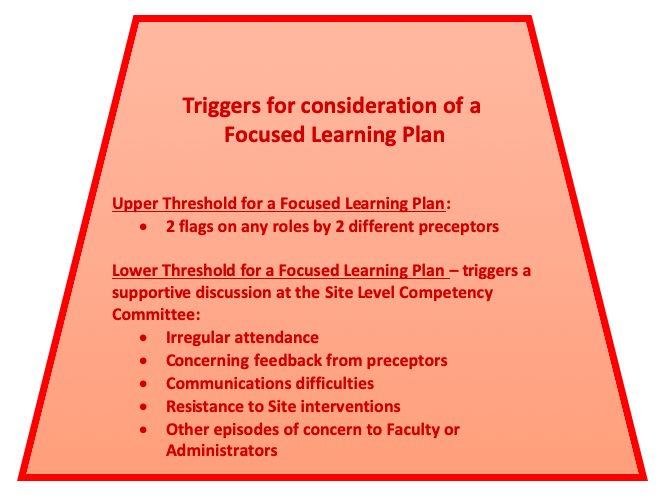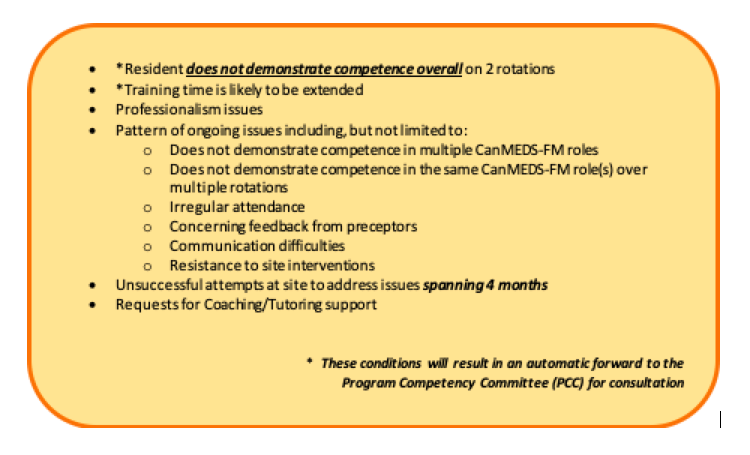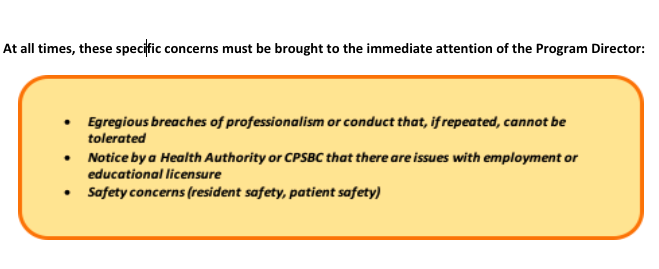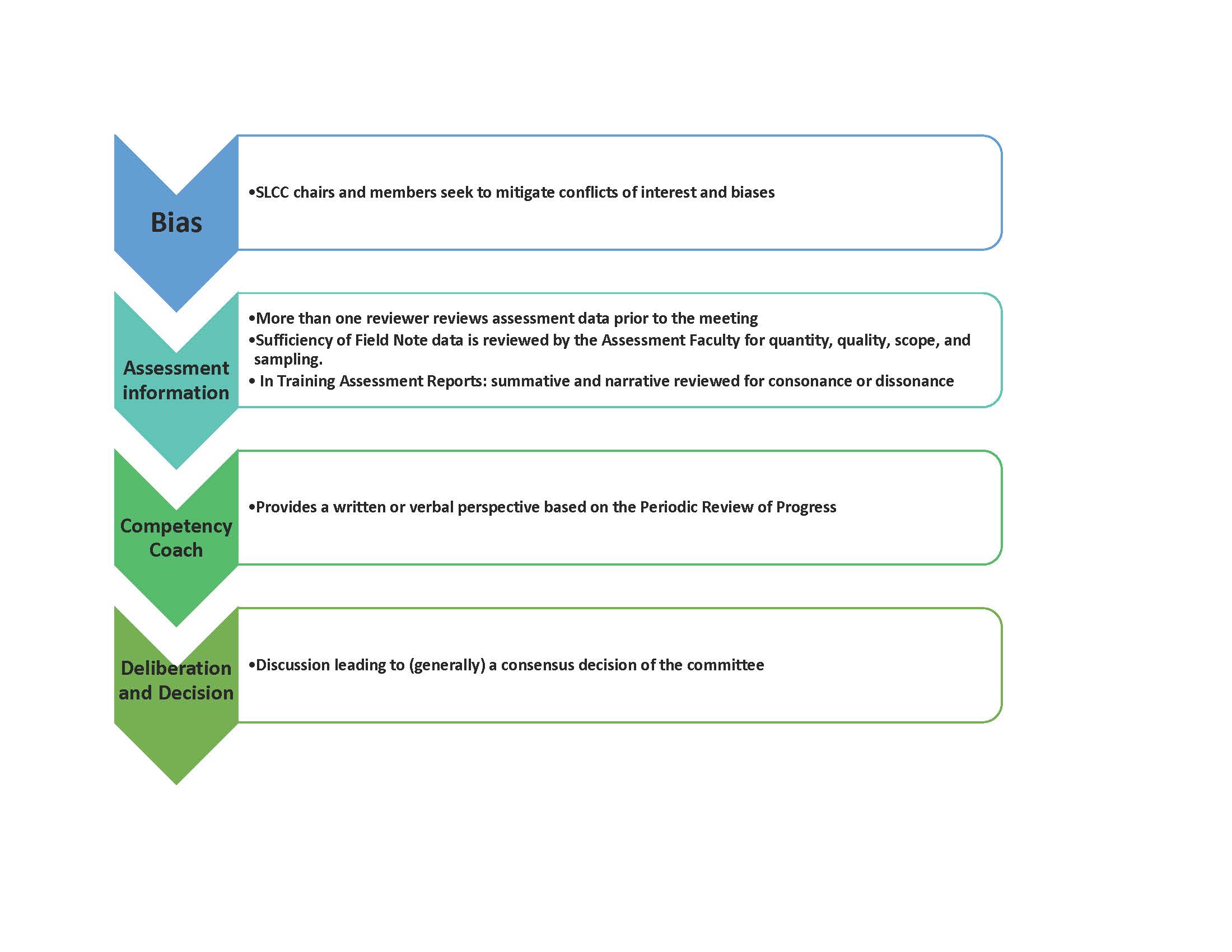Decisions on progress and advancement are now made by Competency Committees. At UBC Family Medicine, each Site has a Site Level Competency Committee. The Program Competency Committee serves to make specific recommendations when a resident is encountering academic difficulties.
The Performance Support Team works with Sites and Residents to support every resident in difficulty through this process.
Preceptors, in contributing to Field Notes and In Training Assessment Reports are key in providing accurate, thoughtful assessments (both formative and summative) that inform decisions on progress and advancement. This page details how the program uses this information in making decisions.
Decisions on competence in a generalist, relationship-based specialty such as Family Medicine are complex and nuanced. Having a small group of experts in both family medicine and medical education, who know the context of training for the resident, and can interpret the assessment information, allows for better, more impartial, less biased decisions to be made than having an individual make decisions. It is now an accreditation standard, to use a competency committee or equivalent.
At this time the Site Level Competency Committees (SLCC) are mandated to make decisions on:
- Progress: (on track/not on track)
- Advancement from R1 to R2
- Program Completion
If performance concerns exist, a Site Level Competency Committee may make the following determinations:
- Educational diagnosis,
- Need for referral to the Performance Support Team (PST)
- Need for a Focused Learning Plan
- If the magnitude or scope of concerns do not exceed the triggers for referral to the Performance Support Team and are within the scope of the threshold for a Focused Learning Plan, the SLCC may recommend that an FLP be instituted for a maximum of 4 months
- Progress on a Focused Learning Plan
Site Level Competency Committee decisions to alter a Learning plan or refer for program support are guided by specific triggers.
- Triggers for the institution of a Focused Learning Plan
b. Triggers for referral to the Performance Support Team
At all times, these specific concerns must be brought to the immediate attention of the Program Director:
Decisions on Advancement and Completion are made using program Benchmarks:
The committee process is governed by the principles and practices of fairness, transparency, being evidence-informed, and humanistic.
At this time all Site Level Competency Committees are using:
- In Training Assessment Reports,
- Field Notes, and
- A synopsis of progress from the Periodic Review. This viewpoint must be informed by both the Resident and Competency Coach.
- Academic and Scholar assessment information (generally as reported at the Periodic Review)
- Module and other information as required for decisions on program completion.
Residents must be aware of the general content of any information that is brought to the Committee.
The committee does not receive the following information:
- Any health or medical information about a resident. The only question of concern is if there is, or is not, a medical condition that may impair resident performance and thus fairness of the assessment.
- Information from the Centre for Accessibility.
- Information of a personal nature that may be discussed at the Periodic Review should not be disclosed to the Site Level Competency Committee. The committee may be informed of any potential impact on performance by the Site Director.
- Reflective writings from the Periodic Review
Any content stemming from the discussion between preceptors and the Site Director must be discussed with the Resident first, and this discussion documented in the Residents record.
Professionalism concerns in the clinical, academic, or educational context may be brought to the attention of the Site Level Competency Committee. These should first be discussed and documented at a Periodic Review or similar meeting.
Where there exist any concerns about progress or performance it is highly recommended that the site assemble an Assessment Summary for the entire committee to review. A copy of the Assessment Summary may be sent to the Resident.
Where there are no concerns about performance, the Field Notes and In Training Assessment Reports, Academic and Scholar assessments must be independently reviewed by more than one faculty for quantity, quality, scope, and sampling across the Essential Skill Dimensions and Core Domains.
Every Site Level Competency Committee uses a templated Terms of Reference, approved by the program that guides membership.
- The Site Level Competency Committee members are primarily drawn from the Site Faculty
- To avoid conflict of interest it is highly recommended that the Site Director not be the Chair of the Site Level Competency Committee.
- All members of the Site Level Competency Committee should inform any recommendations.
- Minutes must be kept that indicate information reviewed, and recommendations made.
- A minimum of 3 members is required.
The primary intent of the program is to support any resident with difficulty navigating and fully remedy concerns about their performance.
Please see the Page on Resident in Difficulty for further detailed information.
The Program Competency Committee makes decisions on Residents who are in academic difficulty and receives and reviews all cases of significant difficulty with Professionalism.
Please see the Page on Resident in Difficulty for more information.



